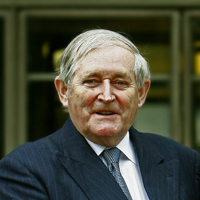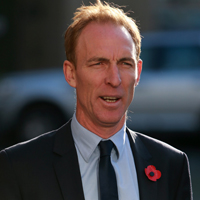
They are the most powerful and influential people in Scotland.
The 100 names cut across all fields including politics, art, religion and literature and exercise their power in all kinds of ways.
Here is the second group, numbers 11-20. To see the other groups, please click on the links at the foot of the article.
Scotland's Power100 1-10
Scotland's Power100 21-30
Scotland's Power100 31-40
Scotland's Power100 41-50
Scotland's Power100 51-60
Scotland's Power100 61-70
Scotland's Power100 71-80
Scotland's Power100 81-90
Scotland's Power100 91-100

11 John Swinney
Affable and very able, John Swinney, 50, is the new Deputy First Minister. As SNP leader between 2000 and 2004, Swinney was a safe pair of hands rather than a trail-blazer, but has impressed as Finance Secretary since 2007. His recent introduction of a Land and Buildings Transaction Tax has been hailed as much more progressive than the old Stamp Duty.
The Perthshire North MSP, a father of three, has been one of two SNP representatives on the Smith Commission.
Watch out for: Occasional forays into First Minister's Questions.

12 Sir Angus Grossart
The founder and chairman of Edinburgh-based merchant bank Noble Grossart, Sir Angus, 77, is highly influential in business and the arts.
A former vice-chairman of the Royal Bank of Scotland and currently chairman of the Scottish Futures Trust, set up to improve public infrastructure investment, he chaired the National Galleries of Scotland and the National Museums of Scotland, and brought his weight to bear in the referendum debate, indicating that he was relaxed about the prospect of independence.
Major achievement: Steering Noble Grossart successfully through the recession.

13 Jim Murphy
Heavily tipped as the next Scottish Labour leader, Murphy, 47, had a good referendum. The MP for East Renfrewshire - the safest Tory seat in Scotland under its previous boundaries - is a former Scottish Secretary and currently serves as Shadow International Development Secretary, though this appointment was seen as demotion from his role as Shadow Defence Secretary.
If made Scottish Labour leader, the Glasgow-born father of three and keen footballer will face a huge fight with the SNP come May.
Least likely to say: "I see myself as a branch-office manager."

14 Ruth Davidson
At 33, gay and only six months an MSP, Davidson broke the mould when she became Scottish Conservative leader in 2011. She has proved herself since as a debater both in Holyrood and during the referendum campaign, where she showed passion and energy.
Now 36, the former journalist came out fighting after a major policy U-turn (having previously said she would not support further devolution, she is now an avid supporter of it) and looks set to have a bright political future.
Greatest achievement: Maintaining her credibility after that infamous "line in the sand" remark.

15 Anna Dominiczak
Professor Dominiczak, 60, is one of Scotland's most eminent scientists, a world-leading cardiovascular expert whose research has focused on identifying genetic factors which may predispose people to heart disease, hypertension and stroke.
Regius professor of medicine, vice-principal and head of the college of medical, veterinary and life sciences at Glasgow University, the mother of one is president of the European Society of Hypertension and has been overseeing for Glasgow University the building of state-of-the-art facilities at the new South Glasgow Hospital.
Least likely to say: "I'm knocking off early today."

16 Sir Tom Devine
The country's pre-eminent historian, he has established himself in the past four decades as a towering and fearless intellect. From proudly working-class Catholic roots, he was an academic tornado from early in his career.
Works such as The Scottish Nation and Scotland's Empire reshaped the way Scotland's past is viewed. Devine was knighted earlier this year, but his services to what he calls the "queen of disciplines" had been acknowledged long before that, as has his inspirational example for younger historians.
Watch out for: A history of Glasgow.

17 Andy Murray
He may have had a difficult year recovering from back surgery and has yet to rediscover the form that won him Wimbledon in 2013, but there's no doubting the growing status of Britain's No 1 tennis player and the fact that the 27-year-old has won over many of those who did not initially warm to his deadpan personality.
In 2013, he was BBC Sports Personality of the Year and GQ Man of the Year. He was even awarded the freedom of Stirling. Murray believes it's far from
over yet.
Most likely to say: "I shouldn't have sent that tweet should I?"

18 Gordon Brown
Even if he is stepping down as a Labour MP, the 63-year-old former Prime Minister's influence is likely to continue for many years to come.
He is credited as one of the men who won it for No in the referendum campaign with his last-minute, foot-stomping tour of the country rallying the troops, and with the debate about the Union continuing, Brown's influence and forceful counsel will carry on as well. After 32 years as a Labour MP, he will now focus on charity work.
High point: His old-school speeches to meeting rooms across the country in the last few days of the referendum campaign.

19 Danny Alexander
Wonkish and sometimes wooden, and often mocked for it, the MP for Inverness, Nairn, Badenoch and Strathspey and Chief Secretary to the Treasury is nonetheless part of The Quad, the four men who run the UK Government: David Cameron, Nick Clegg, George Osborne and 42-year-old Alexander.
Provided he survives as an MP (which he may well do, with help from his friend Charles Kennedy), he has been tipped as a possible future leader of his party.
Watch out for: Alexander at the centre of the talks if the Liberal Democrats hold the balance of power after the General Election.

20 John Curtice
Revered by politics students and journalists alike for his rigorous and impartial analysis of social and political attitudes and electoral behaviour, the Strathclyde University professor of politics is also known to TV audiences
UK-wide as a commentator.
His authoritative blog on What Scotland Thinks, run by the Scottish Centre for Social Research, was required reading for thousands during the referendum campaign.
Curtice, 60, from Cornwall, is co-director of the influential Scottish Social Attitudes surveys and president of the British Polling Council.
Least likely to say: "That last poll changes everything."


Why are you making commenting on The Herald only available to subscribers?
It should have been a safe space for informed debate, somewhere for readers to discuss issues around the biggest stories of the day, but all too often the below the line comments on most websites have become bogged down by off-topic discussions and abuse.
heraldscotland.com is tackling this problem by allowing only subscribers to comment.
We are doing this to improve the experience for our loyal readers and we believe it will reduce the ability of trolls and troublemakers, who occasionally find their way onto our site, to abuse our journalists and readers. We also hope it will help the comments section fulfil its promise as a part of Scotland's conversation with itself.
We are lucky at The Herald. We are read by an informed, educated readership who can add their knowledge and insights to our stories.
That is invaluable.
We are making the subscriber-only change to support our valued readers, who tell us they don't want the site cluttered up with irrelevant comments, untruths and abuse.
In the past, the journalist’s job was to collect and distribute information to the audience. Technology means that readers can shape a discussion. We look forward to hearing from you on heraldscotland.com
Comments & Moderation
Readers’ comments: You are personally liable for the content of any comments you upload to this website, so please act responsibly. We do not pre-moderate or monitor readers’ comments appearing on our websites, but we do post-moderate in response to complaints we receive or otherwise when a potential problem comes to our attention. You can make a complaint by using the ‘report this post’ link . We may then apply our discretion under the user terms to amend or delete comments.
Post moderation is undertaken full-time 9am-6pm on weekdays, and on a part-time basis outwith those hours.
Read the rules hereComments are closed on this article